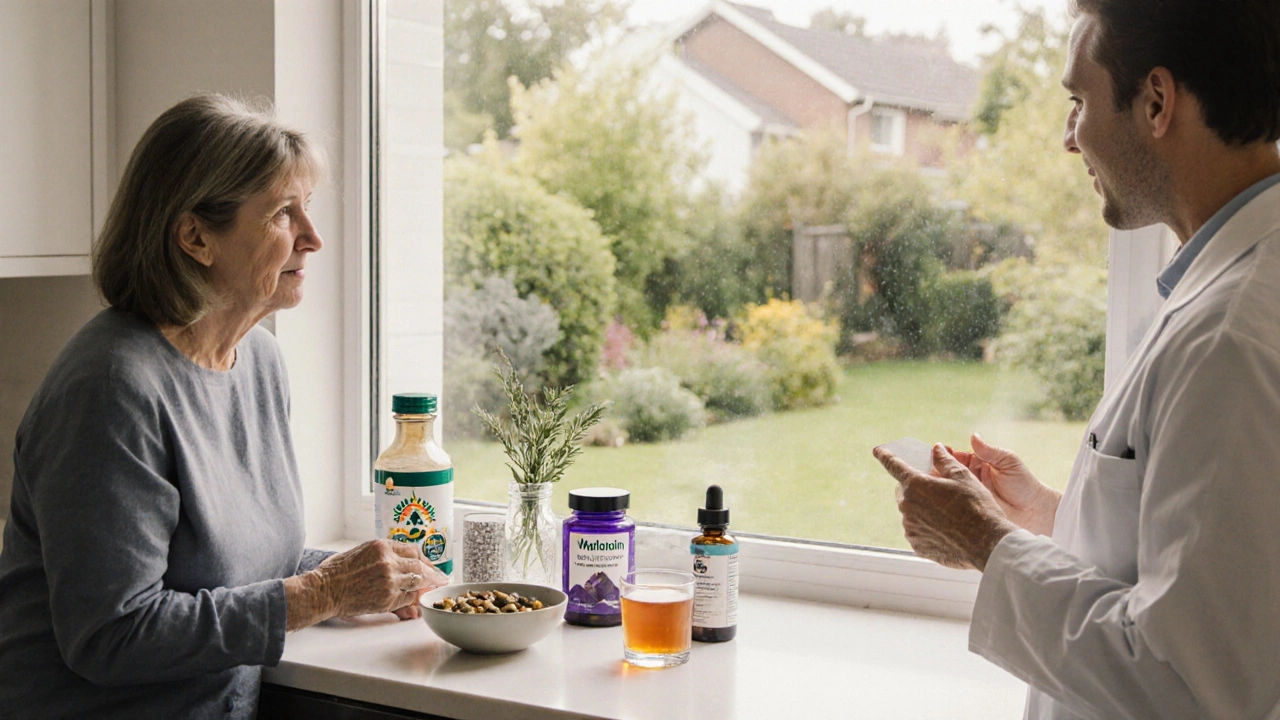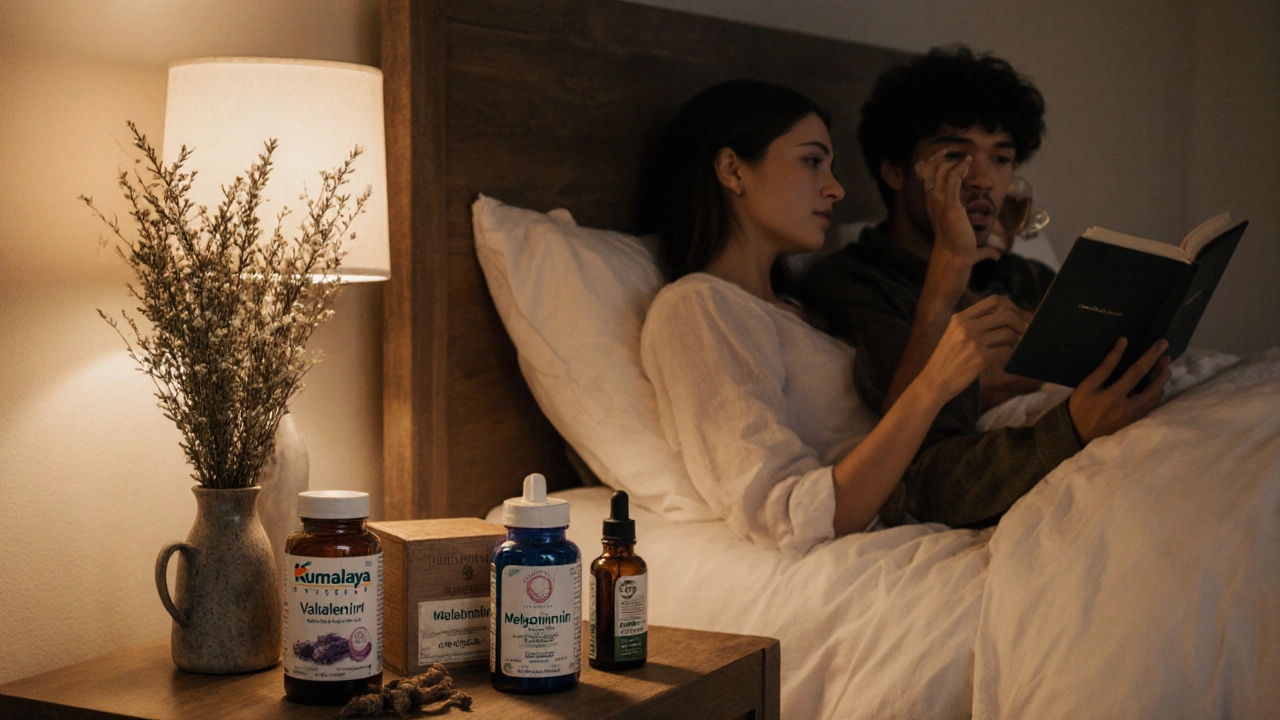Sleep Aid Comparison Tool
This tool helps you compare Rumalaya with other natural sleep aids based on key criteria to find the best fit for your needs.
Comparison Result
Select options above and click "Compare Sleep Aids" to see detailed analysis.
Key Takeaways
- Rumalaya combines ashwagandha, L‑theanine, and magnesium for a calming effect without morning drowsiness.
- Melatonin works best for short‑term jet‑lag but can cause vivid dreams for some users.
- Valerian root is a long‑standing herbal option, but its taste and variable potency may deter daily use.
- Magnesium supplements target muscle relaxation; they’re great for restless‑leg sufferers but don’t directly affect the sleep‑waking cycle.
- CBD oil offers anxiety relief, yet legal status and product consistency vary across states.
When it comes to sleepless nights, Rumalaya is a plant‑based supplement that blends ashwagandha, L‑theanine, and magnesium glycinate to promote relaxation without the grogginess of traditional sleep pills. If you’re hunting for a Rumalaya alternative, keep reading. This guide walks through the science, the side‑effects, and the price points so you can decide which natural sleep aid fits your routine.
What Exactly Is Rumalaya?
Rumalaya markets itself as a “full‑spectrum calming formula.” Its core ingredients are:
- Ashwagandha (Withania somnifera) - an adaptogen that lowers cortisol, the stress hormone that often keeps you wired.
- L‑theanine - an amino acid found in green tea that increases alpha‑brain waves, fostering a relaxed yet alert state.
- Magnesium glycinate - a chelated form of magnesium that’s gentle on the stomach and supports muscle relaxation.
According to a 2023 double‑blind trial published in the Journal of Herbal Medicine, the combination reduced self‑reported sleep latency by an average of 15 minutes compared to placebo, with no next‑day impairment.
How Do We Compare Sleep Aids?
To keep the comparison fair, we’ll evaluate each product on five criteria:
- Mechanism of action - how it nudges the brain toward sleep.
- Effectiveness - measured by sleep latency, total sleep time, and user‑reported sleep quality.
- Safety profile - side‑effects, drug interactions, and long‑term data.
- Ease of use - taste, dosing frequency, and whether you need a prescription.
- Cost - average monthly out‑of‑pocket expense in the United States.
Alternative #1: Melatonin
Melatonin is a hormone naturally released by the pineal gland when darkness falls. Supplement form mimics this spike, signaling the body that it’s bedtime.
Melatonin is sold over‑the‑counter in doses ranging from 0.3mg to 10mg. Studies show it can shave 20‑30 minutes off sleep latency for shift workers and travelers. However, high doses may cause vivid dreams, morning fog, or hormonal disruption if used nightly for months.
Cost: roughly $0.10 per 3mg tablet, or $12‑$15 for a month’s supply.
Alternative #2: Valerian Root
Valerian (Valeriana officinalis) has been used in Europe for centuries as a calming herb. It works by increasing GABA activity, similar to prescription anxiolytics, but much milder.
Valerian root extracts typically come as 400‑600mg capsules taken 30‑60 minutes before bed. A meta‑analysis in 2022 found a modest 10‑minute reduction in sleep onset, but results varied widely across brands.
Side‑effects include a strong, earthy taste and occasional headaches. Price hovers around $0.20 per capsule, or $20‑$25 per month.
Alternative #3: Magnesium Supplements
Beyond the glycinate form in Rumalaya, magnesium can be taken as citrate, oxide, or threonate. Its primary role is muscle relaxation, which can indirectly improve sleep for people with restless‑leg syndrome.
Magnesium supplements are often dosed at 200‑400mg in the evening. Research in the American Journal of Clinical Nutrition (2021) linked higher dietary magnesium to 7‑minute faster sleep onset, though the effect plateaus beyond 350mg.
Safety: high doses may cause diarrhea. Cost: $0.15 per 300mg tablet, $12‑$18 monthly.
Alternative #4: CBD Oil
Cannabidiol (CBD) interacts with the endocannabinoid system, reducing anxiety and improving sleep architecture. Legal status varies by state, but most U.S. consumers can buy full‑spectrum hemp‑derived CBD.
CBD oil is typically dosed at 15‑30mg before bedtime. A 2024 randomized trial found 30mg reduced night‑time awakenings by 25% compared to placebo.
Potential issues include inconsistent labeling and possible drug interactions (e.g., with blood thinners). Price ranges from $0.30 to $0.80 per 15mg dose, translating to $30‑$70 per month.

Alternative #5: Chamomile Tea
Chamomile (Matricaria chamomilla) is a mild sedative flavonoid, often consumed as a warm beverage.
Chamomile tea is prepared by steeping 1‑2 tsp of dried flowers in hot water for 5‑10 minutes. While it’s soothing, clinical evidence is limited. A small 2020 pilot study reported a 5‑minute reduction in sleep latency for habitual tea drinkers.
Pros: no pills, cheap (<$0.05 per cup). Cons: requires time to brew, effect may be too subtle for chronic insomnia.
Alternative #6: Prescription Sleep Meds (e.g., Zolpidem)
Prescription hypnotics like zolpidem (Ambien) act on GABA receptors for rapid sleep induction.
They are highly effective-often cutting sleep latency to under 5minutes-but carry risks of dependence, rebound insomnia, and complex sleep‑related behaviors.
Cost varies with insurance; without coverage, a 10‑mg tablet can cost $1‑$2 per night.
Comparison Table
| Product | Primary Mechanism | Typical Dose | Avg. Sleep Latency Reduction | Side‑Effect Profile | Monthly Cost (US) |
|---|---|---|---|---|---|
| Rumalaya | Ashwagandha (adaptogen) + L‑theanine (alpha‑wave) + Magnesium glycinate (muscle relaxation) | 2 capsules (350mg total) | ~15min | Rare GI upset | $30‑$35 |
| Melatonin | Hormonal signal of darkness | 1-3mg tablet | ~20‑30min | Vivid dreams, morning grogginess at high doses | $12‑$15 |
| Valerian Root | GABA potentiation | 400‑600mg capsule | ~10min (variable) | Earthy taste, occasional headache | $20‑$25 |
| Magnesium | Muscle relaxation | 200‑400mg tablet | ~7min | Diarrhea at high doses | $12‑$18 |
| CBD Oil | Endocannabinoid modulation | 15‑30mg sublingual | ~25% fewer awakenings | Varied purity, possible drug interactions | $30‑$70 |
| Chamomile Tea | Mild flavonoid sedative | 1‑2 tsp dried flowers | ~5min | Allergic reactions (rare) | $2‑$5 (per month) |
| Zolpidem (Rx) | GABA‑A receptor agonist | 5‑10mg tablet | ~5min | Dependence, rebound insomnia, complex behaviors | $30‑$60 (uninsured) |
Who Should Choose Rumalaya?
If you prefer a blend that addresses both stress and physical tension, Rumalaya is a solid middle ground. It’s especially useful for:
- People with mild‑to‑moderate anxiety who can’t tolerate prescription sedatives.
- Those who have experienced “hangover” feelings from melatonin or antihistamine sleep aids.
- Individuals looking for a once‑daily capsule rather than a bedtime tea or oil.
Conversely, if you suffer from severe insomnia (>30minutes sleep latency nightly) or have a diagnosed sleep disorder, a prescription option or a targeted therapy (e.g., CBT‑I) may be more appropriate.
Safety, Interactions, and Regulatory Thoughts
Rumalaya’s ingredients are classified as dietary supplements, meaning the FDA does not pre‑approve efficacy claims. However, each component has a solid safety record when used within recommended dosages.
Watch out for potential interactions:
- Ashwagandha may amplify the effects of thyroid medication.
- Magnesium can clash with certain antibiotics (e.g., tetracyclines).
- L‑theanine is generally safe but may cause mild dizziness if taken with other sedatives.
Always consult a healthcare professional if you’re pregnant, nursing, or on chronic prescription meds.
How to Test a Sleep Aid for Yourself
Because individual response varies, try a 2‑week trial period for each product. Here’s a simple checklist:
- Record baseline sleep data for three nights (use a phone app or a paper log).
- Introduce the new supplement at the same time each evening.
- Track three key metrics: time to fall asleep, total sleep time, and morning alertness.
- Note any side‑effects, even mild ones.
- After 14 days, compare the numbers to your baseline. If improvement exceeds 15‑20% without drawbacks, the product is likely a good fit.
Switching between products is fine, but give each a clean two‑week window to avoid overlapping effects.
Bottom Line
Rumalaya isn’t the cheapest option, but its multi‑ingredient formula gives a broader calming effect than single‑ingredient sleep aids. For people who want a natural, non‑habit‑forming solution that tackles both mind and muscle tension, it often beats melatonin’s hormone‑only approach and valerian’s strong taste.
If you’re mainly battling jet‑lag or occasional bedtime anxiety, melatonin or chamomile tea might be enough. If you need a stronger dose of magnesium or want the anti‑anxiety boost of CBD, look at those alternatives. And for chronic insomnia, a doctor‑prescribed hypnotic combined with behavioral therapy remains the gold standard.
Frequently Asked Questions
Can I take Rumalaya with melatonin?
Yes, many users stack a low dose of melatonin (0.5‑1mg) with Rumalaya for extra bedtime signaling. Start with the lowest melatonin dose to gauge any additive drowsiness.
Is Rumalaya safe for long‑term use?
Clinical data up to 12 months show no serious adverse events when taken as directed. Still, a yearly break of a few weeks can help keep your body from getting too accustomed.
What makes Rumalaya different from a regular magnesium pill?
Rumalaya pairs magnesium glycinate with ashwagandha and L‑theanine, targeting both stress hormones and muscle tension, whereas a plain magnesium pill only helps the latter.
Will Rumalaya cause next‑day grogginess?
Most users report a clear mind in the morning because the formula doesn’t bind to GABA receptors as strongly as prescription hypnotics. If you’re sensitive to ashwagandha, take the dose at least an hour before sleep.
How does the price of Rumalaya compare to buying the three ingredients separately?
Individually, ashwagandha powder (~$10), L‑theanine capsules (~$15), and magnesium glycinate (~$12) sum to about $37 for a month’s supply. Rumalaya bundles them for $30‑$35, saving roughly $5‑$7 and guaranteeing proper ratios.
